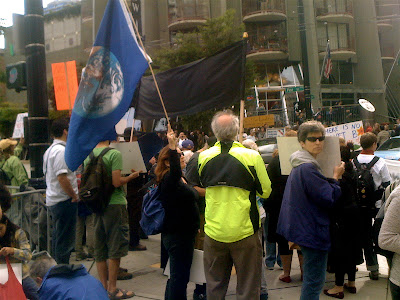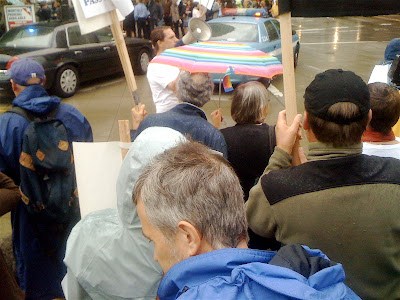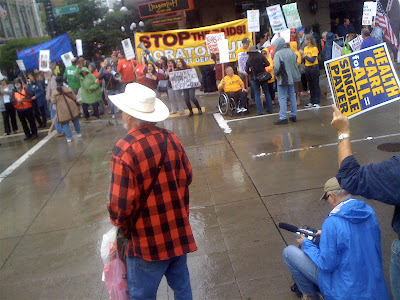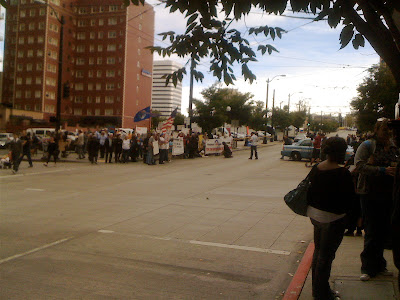The educator with a democratic vision or posture cannot avoid in his teaching praxis insisting on the critical capacity, curiosity, and autonomy of the learner. ~Paulo Freire
(D)emocracy cannot exist without enlightenment. ~Thomas Jefferson
If you've been reading here for long at all, you'll know I have strong opinions about democracy. Indeed, I have strong opinions about specific policies as well, but it's democracy itself that interests me most as a teacher.
I might as well tell you, however, that among the many things I find imperfect in our imperfect world is how Wall Street seems to be getting off scot free (interestingly the source of that idiom comes from the Old English for "tax free") for its part in the tanking of our economy. I've been following the Occupy Wall Street protests in New York City and when I learned there was an Occupy Seattle rally yesterday a few blocks from my home, I thought I'd walk over and show myself, physically, as being frustrated by policies that seem to favor the wealthiest and ignore the rest.

As I approached the Paramount Theater where the rally was to take place, I saw the usual clutch of lefty signs of all sorts, none, strangely, mentioning Wall Street, although many said, "Tax the Rich." It was a smallish group, which is kind of what I expected. When I got to the corner of 8th and Pine, however, I was surprised to find that the entire block was cordoned off up to the theater. That seemed a bit extreme for the handful of mostly gray-haired protesters, but Seattle does have a little history with protests getting out of hand, so I figured they were being overly cautious, although I did feel that my democratic rights were being infringed in a way, being forced by the police to stand in a designated spot with the others a great distance from where we apparently wanted to be.

Not much was happening, so I wandered down Pine Street. It seemed odd to me that there was a large, well-dressed, orderly crowd lined up along the south side of the street. In fact, the farther I walked, the odder it seemed. At first I thought that maybe there was some sort of popular show playing at the Paramount and due to the protest, this is how they were having the people line up so they could get inside in an orderly manner, but four blocks later that began to seem unlikely.
That's when I asked a bicycle cop, "Why are these people in line?"
"The President is coming."
Oh.
This information in my pocket I returned to the intersection, this time to take a look at the democracy taking place back there. I don't mean the campaign speech/fundraiser going on up at the Paramount, but rather the parties who had turned out on a blustery, damp day to raise their voices in favor or against pet causes, hoping their small voice could make a difference in moving our democracy this way or that, even if the President was going to be a block away and not at all likely to see or hear them.
Did you, too, O friend, suppose democracy was only for elections, for politics, and for a party name? I say democracy is only of use there that it may pass on and come to its flower and fruit in manners, in the highest forms of interaction between (people), and their beliefs -- in religion, literature, collages and schools -- democracy in all public and private life. ~Walt Whitman
Democracy is not something that happens, you know, just at election time, and it's not something that happens just with one event. It's an ongoing building process. But it also ought to be a part of our culture, a part of our lives. ~Jim Hightower
There were people from the big unions here, environmental activists, conspiracy theorists, Tea Partiers, Larouchies, and healthcare activists. There were American flags and Gadsden flags and Flags of the Earth. Several different individuals had megaphones, with which they lead chants of various sorts. There was a group of immigration reform activists, quite young and energetic, who arrived with chants and simple choreography that showed the rest of us old farts how democracy in the streets should be done: with passion and joy, not this undercurrent of rancor that poisons so much of our political discourse. I teared up seeing them there, speaking their minds. Later, I saw them walking together and they could have been any other group of young people just hanging out downtown on a Sunday afternoon.

This is what it means to be a good citizen. I don't necessarily mean standing on a street corner chanting, although that can be part of it, but making democracy "a part of our culture, a part of our lives," something these young people were doing without any sense of irony or shame or defensiveness, before heading out for some burgers and fries.
In a true democracy every man and woman is taught to think for himself or herself. ~Gandhi
Education either functions as an instrument which is used to facilitate integration of the younger generation into the logic of the present system and bring about conformity or it becomes the practice of freedom, the means by which men and women deal critically and creatively with reality and discover how to participate in the transformation of their world. ~Paulo Freire
The only freedom that is of enduring importance is the freedom of intelligence, that is to say, freedom of observation and of judgement, exercised in behalf of purposes that are intrinsically worth while. ~John Dewey
Learning to think for ourselves, to deal critically and creatively with reality, to discover how to participate in the transformation of our world: this is what stands at
the heart of a play-based curriculum, and it is what is necessary in order for us to act as full citizens in our democracy. Every time I hear a politician or Wall Street type speak of education as if it's mere vocational training, as if it has some important role to play in "beating" or "keeping up with" some other nation, each time they trot out this or that new technological gewgaw that will allow us to more efficiently cram information into children, I hear people interested in indoctrinating our children in the "logic of the present system." These are people who have lost faith in the ability of people to govern themselves or who are terrified lest the people come to doubt the status quo.
Skepticism: the mark and even the pose of the educated mind. ~John Dewey
Every thinker puts some portion of an apparently stable world in peril. ~John Dewey
When I pick up a toy pig and say, "Moo," or claim that up is down, I am overtly attempting to create a skeptical mind, a mind that thinks for itself, a mind that listens, then doubts if what he hears doesn't jibe with what he already knows of the world. One of my proudest moments as a teacher was the time my Pre-K class forced me to prove to them that one could melt metal. They simply would not take my word for it, and a thinking person shouldn't, so I found a piece of lead and held it on a spoon over a candle flame until it melted.
Civilization is the process in which one gradually increases the number of people included in the term "we" or "us" and at the same time decreases those labeled "you" or "them" until that category has no one left in it. ~Howard Winters
Our classroom becomes a democratic experiment in its own right, a place in which each individual has an equal share in the entire community. It's why
you can't say you can't play, not in here, because there are no private country clubs in this place, there are no places where girls aren't allowed, there is no apartheid. Democracies are a society of "we," and we can only learn about that through the experience of living in a community of "we."
The essence of democracy is its assurance that every human being should so respect himself and should be so respected in his own personality that he should have opportunity equal to that of every other human being to show what he was meant to become. ~Anna Garlin Spencer
Individual commitment to a group effort -- that is what makes a team work, a company work, a society work, a civilization work. ~Vince Lombardi
Perhaps the greatest challenge of every society is finding where we will balance the needs and rights of the individual and the needs and rights of the community. The idea of democracy is that when we give each of us the equal opportunity to be what he is "meant to become" it will ultimately serve us all. At the same time the individual also stands in a position of responsibility to his community. In preschool that means things like taking part in clean-up, engaging in circle time discussions, participating in governance, and honoring the rules that we've all agreed upon.
Democracy cannot flourish where the chief influences in selecting subject matter of instruction are utilitarian ends narrowly conceived for the masses, and, for the higher education of the few, the traditions of a specialized cultivated class. The notion that the "essentials" of elementary education are the three R's mechanically treated, is based upon ignorance of the essential needed for realization of democratic ideals. Unconsciously it assumes that these ideals are unrealizable; it assumes that in the future, as in the past, getting a livelihood, "making a living," must dignify for most men and women doing things which are not significant, freely chosen, and ennobling to those who do them; doing things which serve ends unrecognized by those engaged in them, carried on under the direction of others for the sake of pecuniary reward. ~John Dewey
A play-based curriculum is not one that descends as edicts from the top of a pyramid, but rather rises from the children themselves as they undertake significant, freely chosen, and ennobling activity and thought. This is what leads to the kind of critical, creative mind that can truly said to be educated; one that thinks for itself as opposed to being confined to the mere "essentials" selected by men and women with utilitarian aims who then seek to have it proven to them on tests. This is no way to teach children the skills needed for self governance, but rather the nose-to-the-grindstone conformity that serves the monied elites.
I have written
here and
here that when it comes to measures used by the corporate education reformers, America's public schools are at least on par, if not outperforming the rest of the world, and that I believe their "reformer's" agenda is not in fact one of improving schools, but of improving our economic competitiveness by creating workers for their utilitarian, economic ends. This is not what I would wish for my child or the children I teach. Of course, I want them to learn such utilitarian things as reading, writing and arithmetic, but they need not be artificially placed at the core of the curriculum, because, being utilitarian they will emerge as a matter of course as children seek to pursue their freely chosen ends. This is what is at the core of education, just as it is at the core of democracy.
The death of democracy is not likely to be an assassination from ambush. It will be a slow extinction from apathy, indifference, and undernourishment. ~Robert M. Hutchins
The citizen can bring our political and governmental institutions back to life, make them responsive and accountable, and keep them honest. No one else can. ~John Gardner
It's easy to be cynical about the state of our democracy, especially when you look at party politics. Barack Obama was in Seattle to raise a small portion of the billion plus he'll need to get re-elected, just as George Bush did a few years ago. It has become increasingly true in my lifetime that money talks in Washington, not just in elections, but all the time, every day, through PR campaigns, paid lobbyists, and outright bribery. It's easy to feel helpless, to feel voiceless, to feel trapped behind a barricade a block or more away from the person who needs to hear what I have to say. What good does it do for me to give up a couple hours of a Sunday afternoon to stand on a street corner or call my representatives' offices or even vote for that matter? I'm a drop in the bucket while my opponents have millions to spend on full time advocacy for their positions, be it "education reform" or war and peace.

On my way to the corner of 8th and Pike I passed a young man walking briskly, a protest sign under his arm. His face was flushed and he smiled at me as he passed, a look of giddy excitement on his features. I know that look. I've felt that way while heading out to political rallies. Later I saw him standing on the curb at the southwest corner of the intersection where the Tea Party Patriots had their banner. He was standing in front, raising his sign over his head, punching it into the air. His words were being drown out by the immigration reform youths, but he too was smiling, his face still flush with passion and joy.
(W)henever the people are well-informed, they can be trusted with their own government; that, whenever things get so far wrong as to attract their notice, they may be relied on to set them right. ~Thomas Jefferson
I'm enough of a student of US history to know that every generation has felt that his was the era when democracy would die, that liberty was gasping its final breath and it is exactly this feeling, when it becomes pervasive enough, that finally turns our attention away from our lives of football games and shopping, family and friends, or just hanging out downtown on a Sunday afternoon. And that is all we have on our side to combat the small minority who can afford to hire full time advocates for their cause, who have the deep pockets to buy, influence and bribe: we have, we are, citizens with an hour here or an hour there to think for ourselves and speak out. When enough of us take that time to engage in democracy, we can overwhelm them.
Here's a citizen putting her "utilitarian" preschool skills to work.
But first we must be able to think for ourselves, and that is what seems to be under assault these days. Are you red? Are you blue? Or are you a loon? A true citizen, one who can think for himself, is always a loon, at least
until he has that first follower, then another, then another . . .
We naturally associate democracy, to be sure, with freedom of action, but freedom of action without freed capacity of thought behind it is only chaos. ~John Dewey
For any political leader trying to hold onto power by any means other than serving citizens, nothing is more terrifying than people who know how to think.
I put a lot of time and effort into this blog. If you'd like to support me please consider a small contribution to the cause. Thank you!
4 comments:
brilliant--I'll be sharing this well written, thought provoking article. Thank you!
I'm an unschooling parent and I enjoy your blog as a source of inspiration. This post was exactly what I needed to read right now. Thanks
Tom,
I can appreciate your sentiments and thought here.
I love that you often quote John Dewey. When I was studying at university in 76, I was always drawn to reading Dewey's books. It's great to find others who also responded to his writing.
Here in Canada, sometimes it feels easy to be discouraged by politics, as well.
But as you say, history shows us that there are ups and downs; but still in our countries democracy does flourish.
Brenda
Nothing to add or complain about, just wanted to tell you I'm glad you wrote it.
Post a Comment